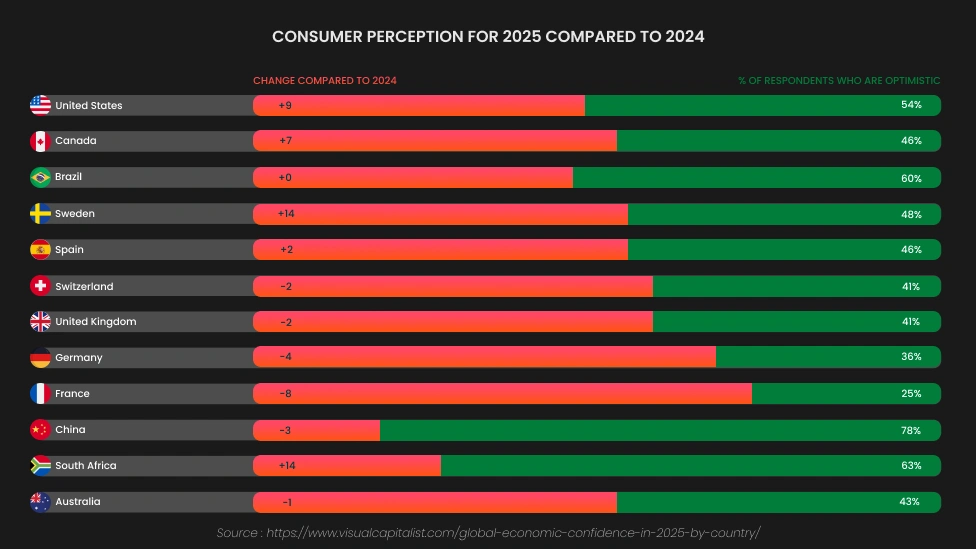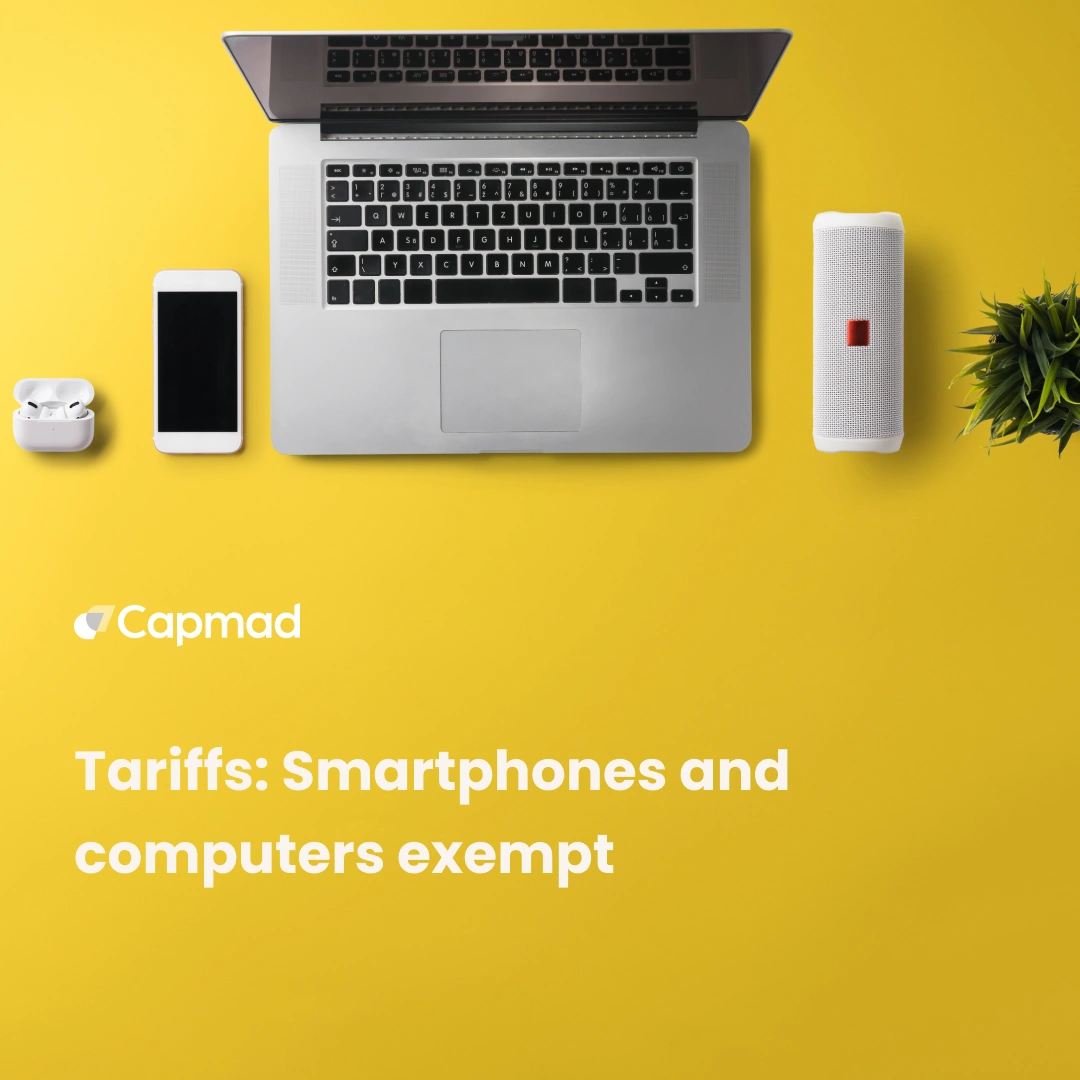Over the past year, the future of the global economy has revealed a mixed outlook amid rising protectionism and geopolitical conflicts. In the United States, growth remains resilient, but rising prices, despite a slowdown in inflation, continue to weigh on consumers’ wallets. European economies are experiencing slower growth, with Germany facing an economic slowdown for the past two years. In China, difficulties in the real estate market are weighing on consumer confidence and economic growth.
In Africa, after a year of slow growth, the continent is poised to enter 2025 with accelerated economic activity, driven by declining inflation, lower interest rates, essential financing, and market reforms.
Growing Optimism for the Global Economy in 2025
Below, let’s observe how consumers perceive the global economy in different countries, based on a survey conducted in November 2024:
Overall, consumers are slightly more optimistic about the global economy heading into 2025, with 51 % believing it will be stronger than in 2024, on average. This is an increase of one percentage point compared to last year’s survey results.
Looking ahead to 2025, the most optimistic countries are in Asia and Africa. Particularly, emerging markets like South Africa, Indonesia, Malaysia, and India. Additionally, Indonesia and India are expected to experience some of the fastest real GDP growth among major economies over the next decade.
Regarding China, 78 % of consumers have an optimistic view of the global economy. In contrast, Japan and South Korea are the two Asian countries with a particularly pessimistic view of the global economy next year.
What Do Consumers Around the World Think?
In South America, the most optimistic countries are Argentina, Peru, and Brazil. Under President Milei, Argentina recorded its first budget surplus in 12 years, thanks to budget cuts and radical reforms. As inflation falls, Argentinians’ confidence in the global economy has significantly improved since last year.
American consumer expectations have increased by nine percentage points from last year, resulting in a majority optimism of 54%. While tariffs may increase price pressures, Trump’s proposed tax cuts could help support economic growth.
In contrast, European countries are the most pessimistic about the global economy. Amid imminent trade wars and persistent energy price shocks, seven of the ten most pessimistic countries are on the continent.
Major Economic Outlooks in Africa
The outcome of the American elections should lead African governments to exert even greater influence in 2025, notably within the BRICS and the G20 under the South African presidency. Progress is already underway in the BRICS, which welcomed new members in January 2024, including Ethiopia and Egypt, as well as Iran, Saudi Arabia, and the United Arab Emirates. Strengthened South-South collaboration is likely to interest Nigeria, Uganda, and Algeria, all of which received official invitations to join the BRICS summit in 2024 as “partner states.”
In 2025, Saudi Arabia and the United Arab Emirates (UAE) are expected to become increasingly significant investors in the African mining sector. By deploying capital to counter Chinese dominance in critical minerals, developing alternative supply sources, and serving as a gateway to Western markets. Saudi Arabia has committed to investing 10 billion USD in African mining projects.
With the AGOA set to expire in September 2025, uncertainty surrounding its renewal is likely to influence investments, particularly in sectors such as textiles, agriculture, and the automotive industry. However, it is unlikely that Africa will be at the center of Trump’s ire, given the modest US trade deficit with sub-Saharan Africa, estimated at 11 billion USD.
Intra-African trade still requires access to strong currencies, costing African businesses around 5 billion USD per year. Efforts to improve cross-border trade through local currency transactions have given rise to a series of competing payment solutions. Anglophone West Africa was the first to adopt the Pan-African Payment and Settlement System (PAPSS), which is now being generalized across the continent.
African Economies : Geopolitical Factor in 2025
2024 was a seismic year for African democracy, with elections in more than a dozen countries and decisive polls in Senegal, South Africa, Botswana, and Ghana. In contrast, 2025 promises to be more stable, with key elections limited to Côte d’Ivoire and Tanzania, and a promising transition underway in Gabon.
- In Côte d’Ivoire, President Alassane Ouattara must decide whether to seek a fourth term, continuing Ivorian growth, or step aside and make way for a new generation.
- In Tanzania, President Samia Suluhu Hassan will seek an elective mandate, having inherited power following the sudden death of her predecessor, John Magufuli, in 2021. However, this depends on her ability to secure the nomination of the ruling party in Tanzania, Chama Cha Mapinduzi (CCM).
- Gabon is expected to hold transitional elections, restoring constitutional order two years after the August 2023 coup that overthrew Ali Bongo and the Gabonese Democratic Party (PDG).
- Burkina Faso, Mali, and Niger initially founded the Alliance of Sahel States (AES) as a framework for collective defense and mutual assistance. The coming year promises to see the Sahelian juntas formally sever their ties with the Economic Community of West African States (ECOWAS). For the 75 million Burkinabe, Malians, and Nigeriens, this could come at the expense of freedom of movement if ECOWAS imposes travel and trade restrictions before an official exit in January 2025. Whatever decision is made, the challenge will be to reconcile the Sahelian juntas’ continued membership in the West African Economic and Monetary Union (WAEMU) and the use of the CFA franc.







